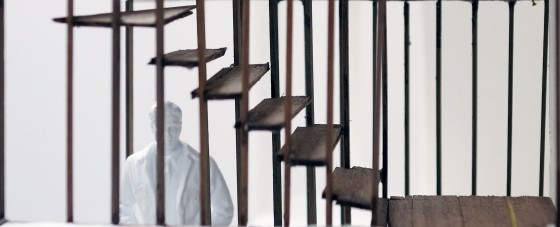Valerie Van der Linden cordially invites you to her public PhD defence
on Tuesay 29 May 2018 at 2PM
in Aula De Molen, Kasteelpark Arenberg 50, 3001 Heverlee, Belgium.
The presentation will be in English.
After the defence, you are kindly invited to the reception in the Salons of the Arenberg Castle.
Please confirm your attendance before 15 May via this link.
You can park at parking Arenberg – De Molen (code: 1701#)
or get off at bus stop Heverlee Kasteel Arenberg.
For questions concerning accessibility you can contact Valerie.Vanderlinden[at]kuleuven.be Please also consult the KU Leuven Access Guide (Auditorium & Salons).
Examination Committee
prof. Ann Heylighen, supervisor
prof. Hua Dong (Tongji University), co-supervisor
prof. Goedele Desmet
prof. Ludo Froyen, chair
prof. Peter Lloyd (University of Brighton)
dr. Kristof Vaes (University of Antwerp)
prof. Karel Vandenhende
Abstract
Due to the increasing complexity of architectural design processes, architects often have no direct access to the perspectives of those they are designing for. Understanding future users is considered essential in design, yet also challenging. People’s experiences, motivations and needs can differ considerably. This project aims to develop design-oriented ways to inform architects about people’s experience in relation to built space. This requires information formats to move beyond traditional ways of ‘informing’, tie in with architects’ ways of working and provide design-relevant insights.
The first part of the project studies how user experience is attended to in present-day architectural design practice. An ethnographic study is conducted in three architectural firms in Flanders. This allows mapping the context of architectural practice, which sets preconditions that new formats need to tie in with. The second part seeks inspiration in techniques from related design disciplines, such as product and service design. Integrating their qualities with the earlier found preconditions informs the development of a scenario-based design approach tailored to architecture. This is tested through workshops in real-life residential care projects in two architecture firms.
The findings indicate that architects’ personal and embodied knowledge about user experience is fragile and challenging to share. Social and material aspects can support each other in transferring knowledge from use to design contexts. Scenario-based design is a family of techniques for explicitly and iteratively exploring user experience in design. It does not only provide a way to introduce information that allows gaining insight into user experience, it can also make user experience tangible, applicable and negotiable in the different stages of the design process. It can provide architects as well as clients and researchers with scaffolding for their initiatives to take on board user perspectives. As such it is expected to support architectural design that addresses societal needs.
This project received funding from KU Leuven and the Research Foundation – Flanders (FWO).
|

